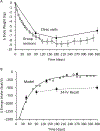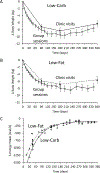Objective versus Self-Reported Energy Intake Changes During Low-Carbohydrate and Low-Fat Diets
- PMID: 30672127
- PMCID: PMC6392435
- DOI: 10.1002/oby.22389
Objective versus Self-Reported Energy Intake Changes During Low-Carbohydrate and Low-Fat Diets
Abstract
Objective: This study aimed to compare self-reported with objective measurements of energy intake changes (∆EI) during a 1-year weight-loss intervention with subjects randomized to low-carbohydrate versus low-fat diets.
Methods: Repeated body weight measurements were used as inputs to an objective mathematical model to calculate ∆EIModel and to compare with self-reported energy intake changes assessed by repeated 24-hour recalls (∆EIRecall ).
Results: ∆EIRecall indicated a relatively persistent state of calorie restriction of ~500 to 600 kcal/d at 3, 6, and 12 months with no significant differences between the diets. ∆EIModel demonstrated large early decreases in calorie intake > 800 kcal/d followed by an exponential return to ~100 kcal/d below baseline at the end of the year. Accounting for self-reported physical activities did not materially affect the results. Discrepancies between ∆EIModel and ∆EIRecall became progressively greater over time. The low-carbohydrate diet resulted in ∆EIModel that was 162 ± 53 kcal/d lower than the low-fat diet over the first 3 months (P = 0.002), but no significant diet differences were found thereafter.
Conclusions: Self-reported ∆EI measurements were inaccurate. Model-based calculations of ∆EI found that instructions to follow the low-carbohydrate diet resulted in greater calorie restriction than the low-fat diet in the early phases of the intervention, but these diet differences were not sustained.
Trial registration: ClinicalTrials.gov NCT01826591.
© 2019 The Obesity Society.
Conflict of interest statement
Figures



References
-
- Schoeller DA. How accurate is self-reported dietary energy intake? Nutr Rev 1990;48: 373–379. - PubMed
-
- Sallis JF, Haskell WL, Wood PD, Fortmann SP, Rogers T, Blair SN, et al. Physical activity assessment methodology in the Five-City Project. American journal of epidemiology 1985;121: 91–106. - PubMed
Publication types
MeSH terms
Associated data
Grants and funding
LinkOut - more resources
Full Text Sources
Medical

